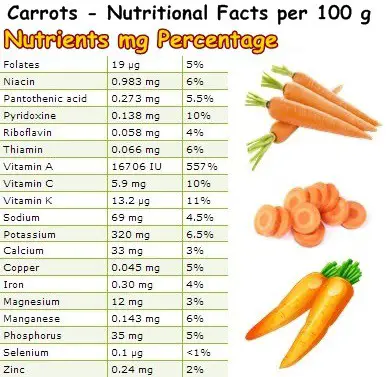Carrots are one of the most appreciated root vegetables in the world. Not only are they sweet and crunchy, but they are also incredibly nutritious. All carrot varieties available in markets today are domesticated forms of the wild carrot, Daucus carota. Although we usually associate carrots with bright orange, the truth is carrots come in a surprising variety of colors such as white, yellow, red or purple.
Each of these colors are indicative of potent phytochemicals, which is why carrot consumption is highly recommended for keeping in great health. Moreover, carrots are an amazing source of vitamin A, providing more than 5 times our daily allowance. Vitamins C and K, B vitamins are also found in generous amounts in carrots, along with small amounts of all many important dietary minerals.

Nutrition facts and benefits of Carrots
Carrots are famous for both their amazing health benefits and for their trademark orange colour. What most people don’t know is that this bright orange pigment (and the yellow one in the case of yellow carrots) is the one responsible for their amazing action on our health. Carrots owe their orange colour to potent phytochemicals called carotenes: beta-carotene, alfa-carotene and gamma-carotene, all of which are converted to a certain degree into vitamin A. Both beta-carotene and vitamin A are essential for a healthy retina and can efficiently improve night vision as well as prevent degenerative eye conditions.
Even more, carrots are a great source of lutein and zeaxanthin, two potent antioxidants known to protect the eyes from the effects of free radical damage. In addition to being great allies for our eyesight, carrots contain other essential phytochemicals called polyacetylenes. Recent research suggests that two important polyacetylenes found in carrots, falcarinol and falcarindiol, may prove extremely efficient in the prevention and treatment of colon cancer.
The popular orange veggies are a healthy addition to any diet, which is why regular consumption is highly recommended. If you are not really found of their crunchy texture, you may opt for a delicious glass of reinvigorating, sweet carrot juice. Alternatively, you can make a dish or soup out of them, bake or roast them, but always remember to reduce the cooking time as much as possible. As with all fruits and vegetables, overcooking ultimately leads to a massive loss of nutrients.

As expected, carrots are a great source of vitamins and minerals. For instance, they are a rich source of B-group vitamins which contribute immensely to maintaining high energy levels by ensuring the proper distribution of energy obtained from carbohydrates, fat and protein. Also, carrots are a good source of vitamin C, a potent antioxidant and anti-inflammatory, with strong antibacterial properties.
You might be interested: Are Baby Carrots Real?
Last but not least, they contain a wide range of important dietary minerals such as potassium, magnesium, calcium, manganese, phosphorus, zinc and sodium. Magnesium is important because it increases calcium absorption. This means that carrots are not only good for your vision, but also promote strong bones, healthy teeth and good cardiovascular health.

100 g of raw carrots provide a decent fiber intake. Dietary fiber is the prerequisite for a healthy colon because it reduces the time it is exposed to waste, not to mention it helps reduce blood cholesterol levels. Each variety with its distinctive colour is indicative of specific natural compounds and boasts unique properties.
While orange carrots are incredibly rich in alfa and beta-carotene, yellow carrots are a good source of lutein. Similarly, red varieties indicate a high lycopene content, whilst purple or black carrots are rich in anthocyanins. Overall, carrots are a rich source of potent natural antioxidants with incredible health benefits.
Also see the benefits of black carrots.
Carrots side effects
Carrots are one of the most harmless foods you can eat and even large amounts do not cause any serious side effects. However, be careful not to overeat because overconsumption can lead to carotenemia, a condition which causes a yellow-orange discoloration of the skin due to excess beta-carotene supplies in the body. The condition in itself is harmless, but it may prove to be a nuisance because the skin takes several weeks to months to return to normal, depending on how much pigmented carotenoid antioxidants the body has accumulated. Because beta-carotene is fat-soluble and, as a result, not eliminated through urine right away like other nutrients is the reason why it may take some time for skin color to return to normal following excessive consumption of carrots (or other red-orange foods).
Also see Can You Eat Raw Carrots?
Conclusion
Aside from this minor, but harmless side effect, carrots are indeed amazing vegetables and consuming them regularly is good for health. Not only are they full of vitamins and minerals, but they are also rich in antioxidants, which makes them a great choice for meeting nutritional requirements and enjoying good health. Of course, in order to absorb as much of the pigmented antioxidant carotenes in them and be able to turn them into vitamin A, carrots need to be eaten together with a source of fat. It can be butter, olive oil, regular milk, aged cheeses, eggs or meat, depending on how you choose to prepare the carrots.
